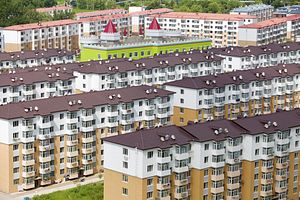For China’s residents, the property glut is now quite evident, and despite unusually generous price cuts they have for now stopped buying mass market real estate in a number of cities. Ghost towns are more prominent than ever. At the same time, high-net-worth individuals continue to purchase luxury apartments in Beijing and suburban homes in California. How can we describe this bifurcation of the residential property market, and what implications does it have for China’s economy?
Residential real estate investment accounts for the majority of China’s real estate market. However, recent reports have revealed that Chinese property prices, particularly in second- and third-tier cities, are falling. Cities such as Hangzhou and Changsha face burgeoning swaths of empty apartment units, and developers have slashed prices in an attempt to lure home buyers. These developers are finding that the price elasticity of demand for residential real estate in China is inelastic: once consumers stop buying, deep discounts are ineffective in drawing them back. Mass market residential property purchases represent much of this decline. Most of those who purchase mass market apartments are middle class, and have invested most of their savings in their homes as primary residences (particularly since purchasing apartments for investment purposes was curbed in 2011).
At the other end of the spectrum are the high-net-worth individuals, those with more than 10 million RMB (about $1.6 million). Their number is rapidly approaching 1 million, or 0.07 percent of the population, according to Bain & Company, and they invest in high end apartments largely in first-tier cities in China, and in homes and apartments in urban and suburban areas abroad. As with all Chinese citizens, wealthy individuals have few alternative options for investing their money, but they also invest abroad to take money out of China, particularly to destinations in which they wish to attend university or live. High-net-worth individuals are more discriminating in their acquisitions and often seek luxury residences.
The two markets have different characteristics, and government policies have aggravated the disparities. Demand-side policies aimed at lowering home prices have reduced sales of mass market apartments, particularly outside of first-tier cities, while supply-side indicators, such as real estate investment and construction, have remained strong (although new housing starts have declined). Conversely, construction of luxury apartments has declined due to policy restrictions while demand for these properties, mainly in first-tier cities, has remained high. Therefore, what we see is a relatively efficient market for luxury residences and a large surplus of properties in the mass market category, which is pulling down property values within that market. Middle class Chinese, then, will experience a decline in wealth while high-net-worth Chinese suffer little in this market (ceteris paribus), sharpening economic disparities between the middle and upper classes.
This may have the impact of reducing consumer demand over time from the middle class as wealth shrinks, countering the government’s aim of boosting domestic demand. This also reduces equity, which is often considered a secondary economic objective, but which is an important one in maintaining social stability. While the wealthy will likely feel the pinch from declining business profits, the relative stability of demand for luxury apartments in the face of an economic slowdown highlights the fact that China’s wealthy have more ways to maintain their income levels than do middle-class citizens.
As long as purchases of mass market residential properties remain down, oversupply of real estate is expected to continue, as real estate supply is slow to respond to the sudden change. This is because the real estate industry the world over requires lead time and investment in both winding up and slowing down construction. Price cuts have been ineffective in selling units, and have angered Chinese residents who had previously purchased units in the same apartment complexes.
What will happen in the market for luxury housing in the coming months is less clear, as economic declines eat away at the wealth of high-net-worth individuals. Those who have not taken on excess debt particularly through the shadow banking sector, who are able to get on board with China’s new industry focuses, and/or who have vested interests in the current administration will thrive, while those whose fortunes were made on the excessive investment boom post-global financial crisis may find the going altogether trickier. The latter may have to sell off their distressed assets, as well as their luxury home in Beijing, and perhaps even take up residence in that Californian home.
Follow Sara Hsu on Twitter @SaraHsuChina

































